
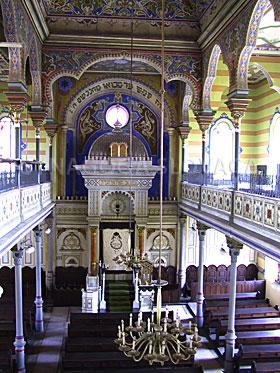 The University of Prešov (Prešovská Univerzita) organized an international conference entitled Jews within and Outside of the Carpathian Basin on November 8, 2012. Our institute was represented by senior research fellow László Szarka who gave a lecture on Establishment of Ghettos and Deportations in the Area of Today’s Southern Slovakia in May-June 1944.
The University of Prešov (Prešovská Univerzita) organized an international conference entitled Jews within and Outside of the Carpathian Basin on November 8, 2012. Our institute was represented by senior research fellow László Szarka who gave a lecture on Establishment of Ghettos and Deportations in the Area of Today’s Southern Slovakia in May-June 1944.
The Balkan Wars at their Centenary was the title of an international symposium about the Balkan wars in 1912–1913 organized by IRCICA (Research Centre for Islamic History, Art and Culture), Sabahattin Zaim University and Zeytinburnu municipality on October 20-21, 2012. At the opening ceremony Professor Kemal Karpat, along with IRCICA leader Halit Eren, as well as ministers delegated by Montenegro, Macedonia, Kosovo and Turkey welcomed Turkish, French, Macedonian, Croatian, American, Greek, Bulgarian, Italian, Turkmenian, Pakistani and Hungarian participants. Institute of History, HAS Research Centre for the Humanities was represented by Gábor Demeter, with a lecture entitled When Sound Judgement of Statesmen Fails: the Role of Count István Burián in Influencing the Foreign Policy of Austria-Hungary during the Balkan Wars.
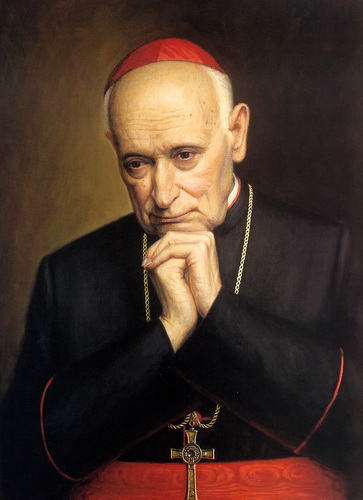 On October 31, 2012 a lecture about Cardinal Joseph Mindszenty was given by our institute’s senior research fellow, Margit Balogh as part of the series Szacsvay Academy – History and Personalities. The events are organized by the Bihar County section of Democratic Alliance of Hungarians in Romania and hosted by Ady Endre Grammar School in Oradea.
On October 31, 2012 a lecture about Cardinal Joseph Mindszenty was given by our institute’s senior research fellow, Margit Balogh as part of the series Szacsvay Academy – History and Personalities. The events are organized by the Bihar County section of Democratic Alliance of Hungarians in Romania and hosted by Ady Endre Grammar School in Oradea.
Elena Dragomir’s essay (Reacţii ale populaţiei româneşti în contextul evenimentelor din Ungaria 1956. [The effects of the Hungarian events in 1956 on the population of Romania] Arhivele Totalitarismului, I. 1-2/2010. 96–110.; II. 1-2/2011. 73–92.), published in two parts is about the effects of the Hungarian revolution and freedom fight of 1956 in Romania outlined by Klára Jakó. The Romanian political and social situation in 1956 is investigated in the light of the Hungarian events of the same year in the essay. One of its goals is to prove that the Hungarian revolution had an effect on the whole of Romania, not only among Hungarians in Transylvania. A special attention is paid to the role of foreign radio channels in informing the Romanian population about the Hungarian revolution, emphasizing the importance of the Hungarian Radio in the case of Hungarians in Transylvania. The essay outlines the hypothesis that news about Hungarian events was in fact spread principally by „information assemblies” and information distributed by official „agitators”.
The author finds that there was an increasing level of discontent among the Romanian population, however the system of oppression functioned very effectively, suppressing every initiative to create some kind of social movement.
Klára Jakó
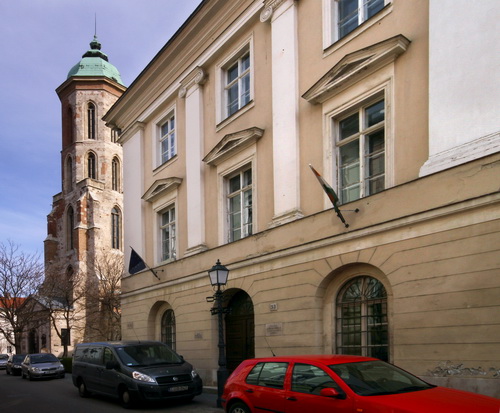 An interesting conference was organized by Institute of History, HAS Research Centre for the Humanities on October 9, 2012 entitled Scientific research of collaboration and agent issue. Pál Fodor, acting Director General of HAS RCH, Director of HAS RCH Institute of History, emphasized that our institute wants to be also a centre of the research regarding the Kádár age, too.
An interesting conference was organized by Institute of History, HAS Research Centre for the Humanities on October 9, 2012 entitled Scientific research of collaboration and agent issue. Pál Fodor, acting Director General of HAS RCH, Director of HAS RCH Institute of History, emphasized that our institute wants to be also a centre of the research regarding the Kádár age, too.
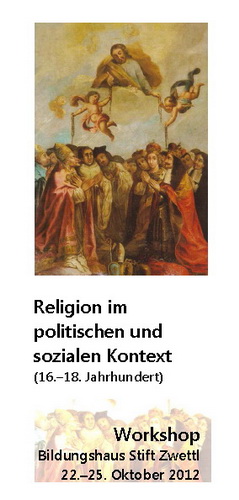 On October 22-25, 2012 a joint conference entitled Religion im politischen und sozialen Kontext was organized in Zwettl, Lower Austria by Institut für Österreichische Geschichtsforschung and Vienna Institute of Hungarian History. Similarly to the first conference in 2011 about the Early Modern Age this year the lectures were given by PhD students and young historians but this time Czech and Slovak colleagues also participated at the event along with Austrian and Hungarian researchers. Béla Mihalik, junior research fellow of our institute, gave a lecture entitled Die Rekatholisierung der städtischen Räume in Kaschau, Erlau und Frauenbach, 1670 bis 1699.
On October 22-25, 2012 a joint conference entitled Religion im politischen und sozialen Kontext was organized in Zwettl, Lower Austria by Institut für Österreichische Geschichtsforschung and Vienna Institute of Hungarian History. Similarly to the first conference in 2011 about the Early Modern Age this year the lectures were given by PhD students and young historians but this time Czech and Slovak colleagues also participated at the event along with Austrian and Hungarian researchers. Béla Mihalik, junior research fellow of our institute, gave a lecture entitled Die Rekatholisierung der städtischen Räume in Kaschau, Erlau und Frauenbach, 1670 bis 1699.
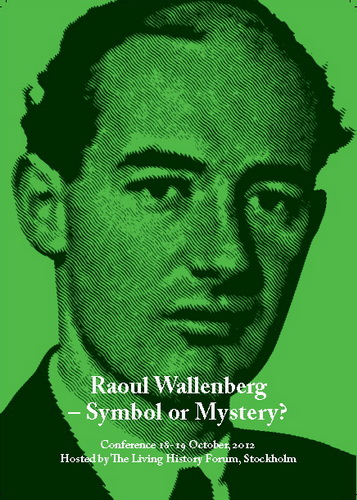 János Pótó, senior research fellow at our institute, leader of Bibliographic Research Team gave a lecture entitled Wallenberg Memorial Sites in Budapest on October 19, 2012 in Stockholm, at the international conference Raoul Wallenberg. Symbol or Mistery? organized by The Living History Forum.
János Pótó, senior research fellow at our institute, leader of Bibliographic Research Team gave a lecture entitled Wallenberg Memorial Sites in Budapest on October 19, 2012 in Stockholm, at the international conference Raoul Wallenberg. Symbol or Mistery? organized by The Living History Forum.
A conference was organized with the title State-Church relations in East Central Europe between 1945 and 1989 – institutions and methods on October 18-20, 2012 by Historical Archives of the Hungarian State Security (Budapest), Posticum – Movimentum Iuventutis Christianae Association (Oradea). Location: Oradea, Posticum Cultural Centre, 26 Teiului Str. Margit Balogh, senior research fellow at our institute gave a lecture at the conference with the title Representations of the Holy See in the Soviet zone, 1944–1950.
Page 9 of 12